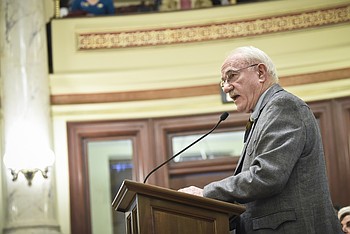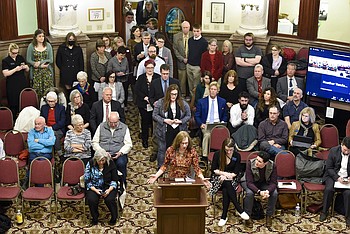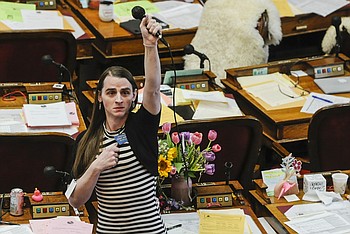Bill to ban care for transgender minors gets heated hearing
AMY BETH HANSON Associated Press | Daily Inter-Lake | UPDATED 1 year, 11 months AGO
HELENA, Mont. (AP) — A proposed bill to deny gender-affirming care to young transgender people in Montana drew emotional testimony Friday. Supporters argued it is needed to protect children, and opponents called it government overreach that would harm transgender children by denying them medically necessary treatment.
The bill by Republican Sen. John Fuller threatens health care providers with the loss of their licenses for a year if they use puberty blockers, hormones or surgery to treat transgender minors. It would also ban mental health providers at psychiatric hospitals that receive taxpayer funding from promoting or advocating using hormones or surgery as a treatment for gender dysphoria. A violation would also lead to a one-year license suspension.
Physicians testified the bill would make them choose between doing what's best for their patients and keeping their license, and that it could exacerbate a shortage in health care providers in the state.
Dr. Lauren Wilson, president of the Montana Chapter of the American Academy of Pediatrics, urged lawmakers to listen to the voices of young transgender people and their parents who would be testifying because "they are the ones who can best tell you what they need."
The Senate Judiciary Committee did not vote on the bill after the five-hour hearing.
Montana is one of at least 18 states with bills targeting health care for young transgender people being brought before legislatures this year. Some bills seek to ban treatment until the person is in their 20s.
Utah's Legislature passed a ban on gender-affirming care Friday. Similar bans have passed in Arkansas and Alabama but are being challenged in court.
Opponents to the Montana legislation promised to challenge the bill in court if it passes. The American Civil Liberties Union of Montana said the proposal is unconstitutional.
Fuller and supporters of the bill said the effort to ban gender-affirming care for minors is meant to protect children from undergoing irreversible surgery. The bill would also ban puberty blockers that physicians say put a pause on puberty to give families time to decide on treatment, as well as hormonal treatment.
Some opponents testified about their regret in transitioning, and others suggested being transgender was part of a fad or involved treating a psychiatric disorder with physically invasive interventions.
Ren Zaluski rejected the "fad" argument, noting "there was a rise in left-handedness once we stopped punishing it."
Opponents, including several young transgender people, said they were not pressured into receiving gender-affirming care, that it was not easily obtained, that it had saved their lives and that denying such care would be cruel.
"I'm finally happy that I am who I'm meant to be," said Sid Beardsley, 17, who reported starting testosterone two weeks ago after a lengthy medical and counseling process.
Several opponents testified to the turnaround in the mental health of previously depressed and suicidal children who received gender-affirming care and acceptance, including doing better in school and being more outgoing.
Darcy Saffer, of Belgrade, said two of her children are transgender and nonbinary and "they are happy, healthy members of their community in part because of the support of their school teachers, their counselors, their parents and because they have access to gender-affirming care."
"As a parent it is my right to seek out professional help for my children and to work with their doctors on the best evidence-based treatment plan for any challenges that arise," Saffer said.
She said the bill was "gross governmental overreach for people who claim to be against big government," and that "it tramples on parental rights for people who claim to protect parental rights."
Fuller's bill would also end Montana Medicaid payments for medication or surgery to treat gender dysphoria, which is defined as the distress caused by a person's gender assigned at birth not matching the gender with which they identify.
Montana's Medicaid program began covering medication treatment for gender dysphoria for minors in 2015, the health department said, and has spent nearly $1.4 million — an average of $173,000 a year. The department did not respond to a question asking how many children had received treatment. It did not appear that any had received surgical care.
State facilities — which Fuller said includes schools — and state employees who work with children could not encourage transgender minors to change their names, clothing or pronouns to match their gender, under the proposal.
Fuller brought a bill in 2021 that would have banned gender-affirming surgery for transgender minors, but it faced significant opposition from medical experts, human rights advocates and the transgender community, who argued gender-affirming surgery is rarely undertaken by minors and that medical decisions should be left up to families. It passed the House but eventually failed in the state Senate.




